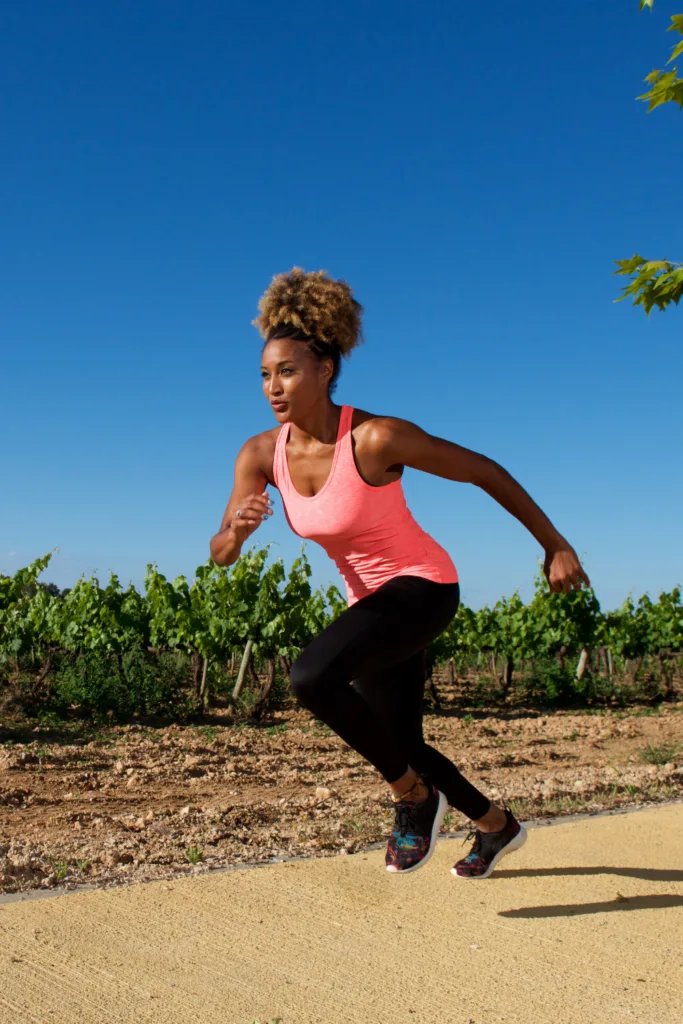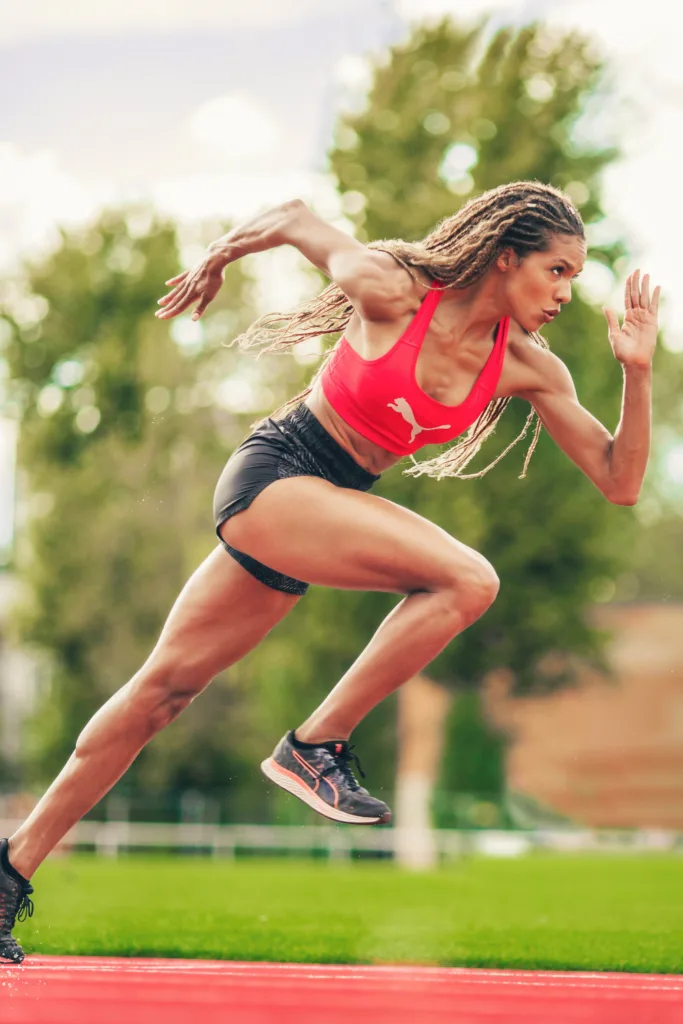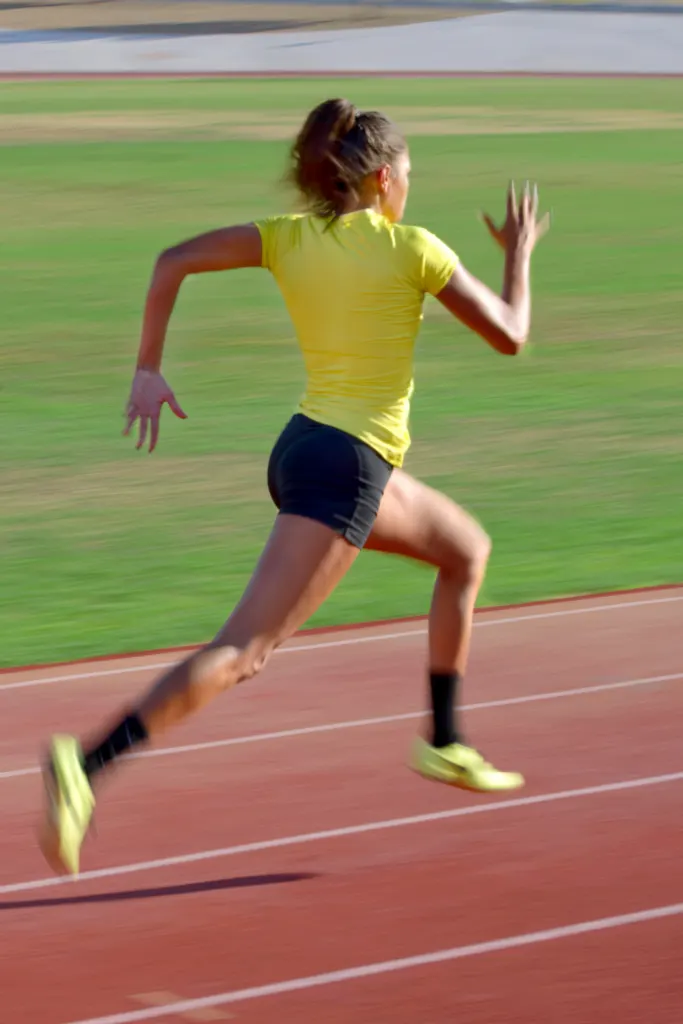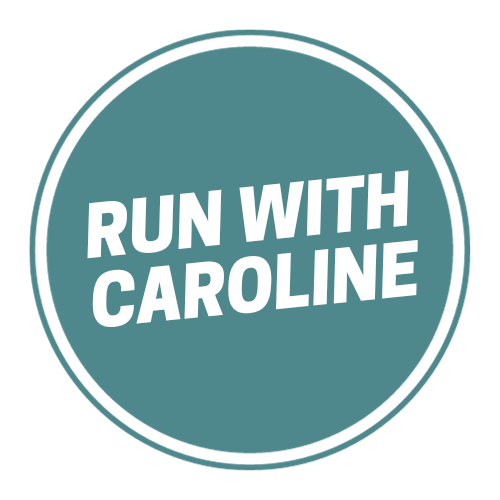Who is the fastest person in the world?
Multiple 100m sprint world records have been made and broken over the last few decades.
Sprint records have been set (albeit unofficially) as far back as 1891.
The first 100m world record was officially set over 100 years ago in 1912 by Donald Lippincott clocking in at 10.6 seconds.
The first person to run one mile in under four minutes was set by Olympian Roger Bannister in 1954.
Surprisingly, Bannister achieved this world-first record with minimal training while practising as a junior doctor.
Fast forward to today and the fastest 100m sprinter has broken the 9.60 second barrier, and the fastest mile time is 3 minutes and 43 seconds.
In this guide we’ll look at what factors affect running speed and the fastest times for each running distance.
We’ll then answer the question: “Who is the fastest person in the world?”
We’ll explore:
- What factors affect running speed?
- What is the fastest mile ever ran?
- What is the fastest 5k ever ran?
- What is the fastest 10k ever ran?
- Fastest times by distance and gender
- Who is the fastest person in the world?
- Top 10 fastest male runners in the world
- Top 10 fastest female runners in the world
Ready?
Let’s go!

What factors affect running speed?
Let’s first take a look at the factors that actually affect running speed.
How can you leverage the science behind running speed for your own training?
Understanding the science is key for any aspiring runner looking to run faster.
It’s not just about physical strength.
Factors like mindset, nutrition and even the gear you wear while running can affect running speed.
Here are the top 10 factors that affect running speed:
- Gender
- Age
- Biomechanics
- Muscle power
- Endurance
- Nutrition
- Hydration
- Strong mindset
- Gear and equipment
- Terrain and altitude
Let’s take a look at these areas in more detail.
#1 Gender
Men are typically faster than women.
As you can see from the top 10 lists at the end of this guide, men dominate the top 10 fastest sprinters in the world list.
This is because men have greater muscle mass and higher levels of the sex hormone testosterone which helps keep muscles and bones strong.
In fact, one of testosterone’s main functions is to build muscle strength.
One 1996 study concluded that supraphysiologic doses of testosterone (i.e. more than what is normally present in the body), especially when combined with strength training, increases fat-free mass and muscle size and strength in normal men.
If you have low levels of testosterone, you may find it difficult to build muscle because low testosterone turns muscle into fat.
Women naturally have lower levels of testosterone.
However some studies have suggested that research conducted to date does not support an association between testosterone and muscle mass, strength or performance in women.
#2 Age
Research tells us that the younger the runner, the faster the runner.
Of course, there may be exceptions to this rule but typically this is what the data tells us.
Once you reach 40 years old, your running speed will start to slow down gradually.
One study found that between the age of 40 and 70, your running speed slows down by approximately 1% per year.
Adding that once you reach your late 70s, you begin to decline by about 1.5% each year.
#3 Biomechanics
Your biomechanics have a direct impact on your ability to run fast.
In other words, how you run and your running technique have a big say in running speed.
This includes everything from your running form and posture, arm swing, foot strike and stride length.
#4 Muscle power
Your muscles are made up of different muscle fibres.
Some of the best sprinters in the world have a high proportion of fast twitch muscle fibres.
Fast twitch muscle fibres are responsible for generating explosive power and speed and maximum power with each stride.
Activities like sprinting and hill repeats develop and enhance these types of fibres.
#5 Endurance
In order to run faster and maintain speed for longer periods of time, you need to combine short bursts of power with sustained endurance.
This is why it’s so important to include a variety of training activities in your training plan alongside long distance running.
Activities like interval training, tempo running, Fartlek training, hill repeats and strides are all great forms of speed training to include as part of a structured training plan.

#6 Nutrition
High performance needs to be fuelled in the right way. The food and drink you consume matters.
Your diet should focus on good quality sources of carbohydrates, protein and fat as well as essential vitamins and minerals.
Carbohydrates are the ultimate source of energy for runners, whereas protein aids in muscle development and recovery.
This means opting for complex carbohydrates such as quinoa, sweet potato, oatmeal and whole grain foods instead of refined carbohydrates like white bread, some breakfast cereals, pastries, white flour and pizza dough.
Some good sources of protein include eggs, chicken, fish, tofu, cottage cheese, lentils and nuts.
#7 Hydration
It’s essential you replace any fluids lost through sweat during exercise by drinking a lot of water and sports drinks.
Proper hydration is critical for optimum performance and overall health.
Aim to drink at least 8 glasses of water a day, especially if you’re training every day.
#8 Strong mindset
In addition to physical training, mental toughness is incredibly important.
Many athletes use positive self-talk, visualisation techniques and breathing exercises to stay focused and calm under pressure.
Positive self talk, when practiced regularly, is a great way to boost your confidence on and off the running track.
Visualisation techniques also help you stay focused on your running goals.
For example, picturing yourself crossing the finish line first and winning the race may help you stay motivated during training and even during the race itself.
Breathing also plays an important role.
By keeping your breathing steady and controlled, this will help you maintain your speed and endurance throughout your run.
Training day in day out can be physically and mentally demanding, so these exercises will help you through some tough training moments.
#9 Gear and equipment
The right running shoes have a huge impact on running performance.
They provide the necessary comfort and support to prevent injuries and help you run more efficiently.
Certain running shoes are designed to maximise speed and reduce drag on the track.
Some athletes also carefully choose their running gear to find the right balance between comfort and functionality.
There have been plenty of running innovations in sports technology and equipment over the last few decades – from wearable tech to certain fabrics.
#10 Terrain and altitude
Running on uneven terrain is typically slower than running on a flat surface like a 100m running track or road.
Likewise, if you’re running at a high altitude, this will affect your race times.
At high altitudes there is less oxygen available for your muscles which can lead to tiredness and fatigue.
Related: 12 trail running tips for beginners

What is the fastest mile ever ran?
The world record for the fastest mile ever ran was set by Moroccan sprinter Hicham El Guerrouj in 1999.
At a time of 3:43:13 – this is still the fastest mile time to beat.
The current female world record mile time is 4:12:33 and this was set by Dutch athlete Sifan Hassan in 2019.
Related: How to use Jeff Galloway’s magic mile running test
What is the fastest 5k ever ran?
The world record for the fastest 5k road race ever ran was set by Ethiopian long distance runner Berihu Aregawi with a time of 12 minutes and 49 seconds.
This record was set on 31 December 2021 in Barcelona.
The female world record holder for the 5k road race is Eigayehu Taye with a time of 14 minutes 19 seconds. This record was set in Barcelona in 2021.
The world record holder for the fastest 5,000 metres race is Joshua Cheptegei with a time of 12:35:35. This record was set in 2020.
The female world record holder for the 5,000 metres distance is Faith Kipyegon with a time of 14:06:62.
| Distance | Male world record | Female world record |
| 5km road race | Berihu Aregawi (12.49) | Ejgayehu Taye (14.19) |
| 5,000 metres | Joshua Cheptegei (12:35:35) | Faith Kipyegon (14:06.62) |
Related: How to run a 5k in under 20 minutes
What is the fastest 10k ever ran?
The world record for the fastest 10k road race ever ran was set by Rhonex Kipruto with a time of 26 minutes and 24 seconds.
The female world record holder for the 10k road race is Yalemzerf Yehualaw with a time of 29 minutes 14 seconds.
The world record holder for the fastest 10,000 metres race is Joshua Cheptegei with a time of 26:11:00.
The female world record holder for the 10,000 metres distance is Letesenbet Gidey with a time of 29:01:03.
| Distance | Male world record | Female world record |
| 10k road race | Rhonex Kipruto (26.24) | Yalemzerf Yehualaw (29.14) |
| 10,000 metres | Joshua Cheptegei (26:11:00) | Letesenbet Gidey (29:01:03) |
Related: The ultimate beginner 10k training plan: Week by week plan + printable

What is the fastest half marathon ever ran?
The world record for the half marathon is 57 minutes and 31 seconds.
This record was set by Ugandan long distance runner Jacob Kiplimo in Lisbon in 2021.
The female world record holder is Letesenbet Gidey with a time of 1:02:52.
Gidey set this record in October 2021.
| Distance | Male world record | Female world record |
| Half marathon | Jacob Kiplimo (57.31) | Letesenbet Gidey (1:02:52) |
Related: What is a good half marathon time? Average half marathon times by age and gender
What is the fastest marathon ever ran?
The fastest marathon time was set by Eliud Kipchoge at the 2022 Berlin Marathon.
With a time of 2:01:09 – Kipchoge has run five of the seven fastest marathons in history.
The female world record for the fastest marathon was set by Ethiopia’s Tigst Assefa in Berlin in September 2023, lopping off more than two minutes from the previous best to clock an official time of 2 hours 11 minutes and 53 seconds.
| Distance | Male world record | Female world record |
| Marathon | Eliud Kipchoge (2:01:09) | Tigst Assefa (2:11:53) |
Related: Intermediate half marathon training plan: Week by week plan + printable
Fastest times by distance and gender
If you’re wondering who is the fastest person for other running distances, here are the fastest race times ranked by distance and gender according to World Athletics.
| Distance | Male world record | Female world record |
| 200 metres | Noah Lyles (19.67) | Julien Alfred (21.91) |
| 300 metres | Letsile Tobogo (31.52) | Beatrice Maslingi (34.60) |
| 400 metres | Muzala Samukonga (43.91) | Marileidy Paulino (48.98) |
| 600 metres | Ryan Sanchez (1:13.97) | Ajee Wilson (1:24.45) |
| 800 metres | Emmanuel Wanyoni (1:43.27) | Keely Hodgkinson (1:55.77) |
| 1,000 metres | Ignacio Fontes (2:19.03) | Majtie Kolberg (2:37.85) |
| 1,500 metres | Timothy Cheruiyot (3:31.47) | Faith Kipyegon (3:49.11) |
| 10 miles road race | Benard Kibet (44.04) | Evaline Chirchir (50.32) |
Related: Running a mile a day: Benefits + 9 reasons to do it

Who is the fastest person in the world?
Jamaican sprinter Usain Bolt is widely considered the fastest person in the world and the fastest sprinter on the planet.
In Berlin in August 2009, Bolt set the world record for the 100m sprint at 9.58 seconds.
This equates to 10.44 metres per second, or 23.25 miles / 37.58 kilometres per hour.
Bolt reached a top speed of 27.33 miles / 43.99 kilometres per hour towards the end of the sprint.
Before Bolt’s world record in 2009, no other sprinter had broken the 9.60 second barrier.
Since 1987, no men’s 100m world record had stood for more than three years and three months.
Bolt still remains the fastest person in the world and his record was made 14 years ago.
Related: How long does it take to run a mile? Averages by age and gender
Top 10 fastest runners in the world
Here are the top 10 fastest runners in the world by gender according to World Athletics.
They have been ranked by their 100m sprint times which is universally recognised as the indicator of speed.
- Usain Bolt (Jamaica) – 9.58 seconds
- Tyson Gay (United States) – 9.68 seconds
- Yohan Blake (Jamaica) – 9.69 seconds
- Asafa Powell (Jamaica) – 9.72 seconds
- Justin Gatlin (United States) – 9.74 seconds
- Christian Coleman (United States) – 9.76 seconds
- Trayvon Bromwell (United States) – 9.76 seconds
- Fred Kerley (United States) – 9.76 seconds
- Ferdinand Omanyala (Kenya) – 9.77 seconds
- Nesta Carter (Jamaica) – 9.78 seconds
Here are the top 10 fastest female runners in the world:
- Florence Griffith-Joyner (United States) – 10.49 seconds
- Elaine Thompson-Herah (Jamaica) – 10.54 seconds
- Shelly-Ann Fraser-Pryce (Jamaica) – 10.60 seconds
- Carmelita Jeter (United States) – 10.64 seconds
- Marion Jones (United States) – 10.65 seconds
- Shericka Jackson (Jamaica) – 10.71 seconds
- Sha’Carri Richardson (United States) – 10.71 seconds
- Marie-Josee Ta Lou (Cote d’Ivoire) – 10.72 seconds
- Christine Arron (France) – 10.73 seconds
- Marlene Ottey (Jamaica) – 10.74 seconds
Related: How to run an 8 minute mile: 8 ways to run faster
- 5 things I wish I’d known before returning to running - March 3, 2024
- Running 20 minutes a day: Benefits + how to start - January 27, 2024
- How to run your first 2 hour half marathon - January 16, 2024
